Tales from the Terminal Room ISSN 1467-338X
June 2013, Issue No. 112
Editor: Karen Blakeman
Published by: RBA Information Services
Tales from the Terminal Room (TFTTR) is an electronic newsletter that includes reviews and comparisons of information sources; useful tools for managing information; technical and access problems on the Net; and news of RBA's training courses and publications. Many of the articles will have already appeared on Karen Blakeman's Blog at http://www.rba.co.uk/wordpress/
Tales from the Terminal Room can be delivered via email as plain text or as a PDF with active links. You can join the distribution list by going to http://www.rba.co.uk/tfttr/index.shtml and filling in the form. You will be sent an email asking you to confirm that you want to be added to the list. TFTTR is also available as an RSS feed. The URL for the feed is http://www.rba.co.uk/rss/tfttr.xml
In this issue
- Search tools
- Google drops the tilde operator
- Google adds nutrition facts
- Farewell AltaVista
- North Wales Libraries Partnership Top Tips
- Company Check: free UK company and director information
- Twitter notes
- Forthcoming workshops and meetings
Search Tools
Google drops the tilde operator
Google has dropped the tilde (~) synonym operator because it wasn't much used and Google could not justify the cost of maintaining the index and code. (http://googlesystem.blogspot.co.uk/2013/06/googles-tilde-operator-no-longer-works.html).
Although Google automatically looks for variations on your terms, placing a tilde before a word seemed to look for more variations and related terms. It meant that you didn't have to think of all the possible permutations of a word. It was also very useful if you wanted Google to run your search exactly as you had typed it in except for one or two words. The Verbatim option tells Google to run your search without dropping terms or looking for synonyms, but sometimes you might want variations on just one of the words. That was easily fixed by placing a tilde before the word. Now we are left with the OR command, which is unreliable at the best of times.
I must admit I didn't see this one coming. My money was on another option going first.
Many thanks to Aaron Tay (@aarontay) for the alert.
Google adds nutrition facts
Google is now showing detailed nutritional facts for food. Type in the name of a food and Google brings up a side panel to the right of the standard results showing images, Calories per 100gm, levels of fat, cholesterol, carbohydrate, protein and selected vitamins and minerals.
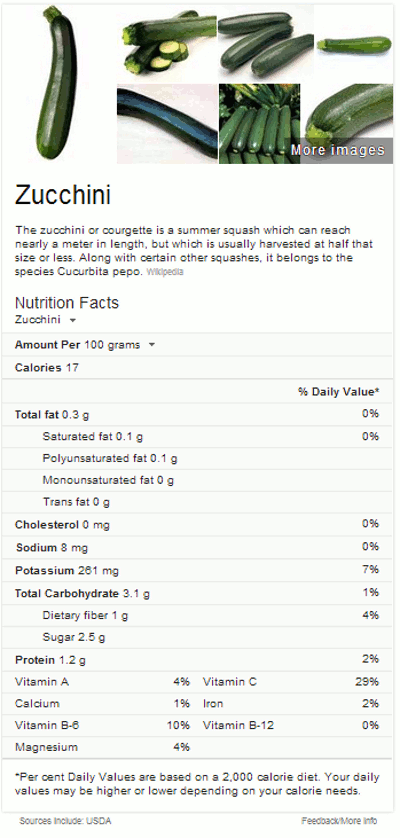
You can bring a specific nutritional fact to the top of the results by including it in the search, for example iron in spinach.
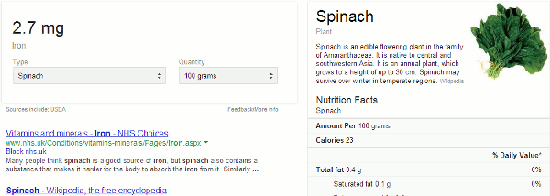
Typing in just the name of a food works in most cases but for some you have to be more specific to pull up the facts. Butter and olive oil are two where you have to include additional terms, for example calories. It also does not have facts for the more unusual foods such as scorzonera and salsify.
The general description is taken from Wikipedia. The sources for the facts include USDA (US Department of Agriculture) so the figures for Daily Values may not be the same as the EU Recommended Daily Allowance.
Farewell AltaVista
Yahoo has finally pulled the plug on AltaVista. It appears as a one line entry in Yahoo's latest list of closures (http://yahoo.tumblr.com/post/54125001066/keeping-our-focus-on-whats-next) with the comment “Please visit Yahoo! Search for all of your searching needs”. AltaVista was started by Digital Equipment in 1995 and quickly became the default search engine for many of us. I still meet people who have remained loyal to AltaVista even though it lost its unique search features a long time ago. Danny Sullivan has written a short history and eulogy for the search engine at http://searchengineland.com/altavista-eulogy-165366 - “A Eulogy for AltaVista, The Google of its Time”. Great though it was, some of us had already defected to the Inktomi powered search engine HotBot by the time Google had arrived on the scene. Alas, HotBot is now a shadow of its former self and AlltheWeb, which Yahoo had also acquired, was closed down in April 2011.
I've unearthed the AltaVista chapter and summary that I wrote for an early edition of Search Strategies. The chapter is at http://www.rba.co.uk/search/altavista/AltaVistaChapter.pdf and the summary sheet at http://www.rba.co.uk/search/altavista/avsumm.pdf
North Wales Libraries Partnership Top Tips
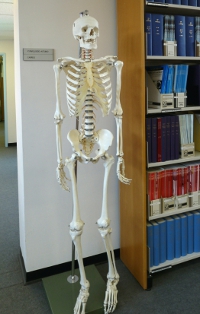 The John Spalding Library in Wrexham hosted the North Wales Libraries Partnership (NWLP) workshop “Search is more than just Google”. Delegates from public, government, academic and NHS libraries gathered together to look at the effect of mobile technologies on search, open access, getting better results from Google and alternative search tools. The consensus reached during one of the breaks was that Cyril, one of the library's residents and pictured on the left, should have ignored Google's nutrition advice and gone for the more authoritative sources available in the library and on the web. If only he had waited and attended the workshop he would have known exactly where to look!
The John Spalding Library in Wrexham hosted the North Wales Libraries Partnership (NWLP) workshop “Search is more than just Google”. Delegates from public, government, academic and NHS libraries gathered together to look at the effect of mobile technologies on search, open access, getting better results from Google and alternative search tools. The consensus reached during one of the breaks was that Cyril, one of the library's residents and pictured on the left, should have ignored Google's nutrition advice and gone for the more authoritative sources available in the library and on the web. If only he had waited and attended the workshop he would have known exactly where to look!
There was much discussion on how mobile devices change how we can search – not always for the best – and there was concern, as usual, over how much we willingly give away about ourselves to services such as Google and Facebook. Open access was debated in the afternoon along with possible directions for academic publishing.
An edited set of the slides is available on authorSTREAM at http://www.authorstream.com/Presentation/karenblakeman-1856150-search-google and Slideshare at http://www.slideshare.net/karenblakeman1/search-is-more-than-just-google.
The Top Tips that the group came up with included some of the usual advanced Google commands but others concerned cloud computing and social media. Here they are.
1. Back up your stuff. Having your data hosted in the cloud means you don't have to worry about it disappearing when your laptop or server crashes. But what if your cloud service goes under or your account is deleted for some reason? Have you made a local backup of your essential files and treasured family photos? One of the participants mentioned the Library of Congress digital preservation toolkit for preserving family memories (http://www.digitalpreservation.gov/personalarchiving/).
2. Private browsing for “un-personalising” search results. If you want to make sure that your results are not being influenced by past searches and browsing behaviour, find out where the private browsing option is in your browser (in Chrome it is called Incognito). This ignores all cookies and past search history and is as close as you can get to unfiltered results.
3. Change the order of your search terms to change the order in which results are listed. This is an old trick but still seems to work.
4. Use advanced search commands such as site:, filetype:, intext:, to focus your search. Some of the commands are available not just in Google but also in Bing and DuckDuckGo.
5. Create “newspapers” of articles mentioned on Twitter, Facebook, Google+ or news sites by using services such as Paper.li (http://paper.li/). These can be generated from hashtags, keyword searches or your own Twitterstream. Have a look in the Paper.li news stand to see if someone has already created a paper on your topic. Paper.li automatically compiles the newspaper but there are other services such as Storify (http://storify.com/) and Scoop.it (http://www.scoop.it/) that enable individuals to curate the content that appears in their personal newspaper.
6. Guardian Data Store for datasets and visualisations relating to stories in the news (http://www.guardian.co.uk/data). This was so popular that it was mentioned twice for inclusion in the top tips. What people liked about this is that the source of the data is always given and there are links to the original datasets.
7. Million Short http://millionshort.com/ If you are fed up with seeing the same results from Google again and again give Million Short a try. Million Short runs your search and then removes the most popular web sites from the results. Originally, as its name suggests, it removed the top 1 million but the default has changed to the top 10,000. The page that best answers your question might not be well optimised for search engines or might cover a topic that is so “niche” that it never makes it into the top results in Google or Bing. One person loved it because the type of research they do often pulls up pages of Amazon and eBay results in Google. Not a problem with Million Short
8. Google Reading level to change the type of results that you see. Run your search and from the menu above the results select ‘Search tools', ‘All results' and from the drop menu ‘Reading level'. Options for switching between basic, intermediate and advanced reading levels should then appear just above the results. Click on the Advanced option to see results biased towards research.
9. Beware fragmented discussions. Articles can be posted and reposted in many different places: blogs, websites, LinkedIn, Facebook etc. with the result that potentially useful and informative discussions are dotted all over the place. Learn how to locate fragmented discussions in your subject area and where they are likely to occur.
10. Try something other than Google. Take a look at the slides for a few(!) suggestions of what you could use.
Company Check: free UK company and director information
Company Check (http://companycheck.co.uk/) and its sister website Company Director Check are two of the more popular services on my business and search workshops. They repackage official information from Companies House and provide much of it free of charge. I first reviewed them in 2011 (http://www.rba.co.uk/wordpress/2011/07/20/company-information-company-check-gives-more-uk-data-for-free/ and http://www.rba.co.uk/wordpress/2011/11/14/free-uk-company-information-company-director-check/) and since then there have been many updates and additions. A recent change is that company and director information have been pulled together on the Company Check website making it easier to flip between companies and directors. Data on companies in Ireland is also now available.
Companies and directors can be searched from the same search box. You then select the appropriate entry from a list of possible matches. The company summary is free of charge and includes a business overview, data on its status and business activities, and a list of trading addresses.
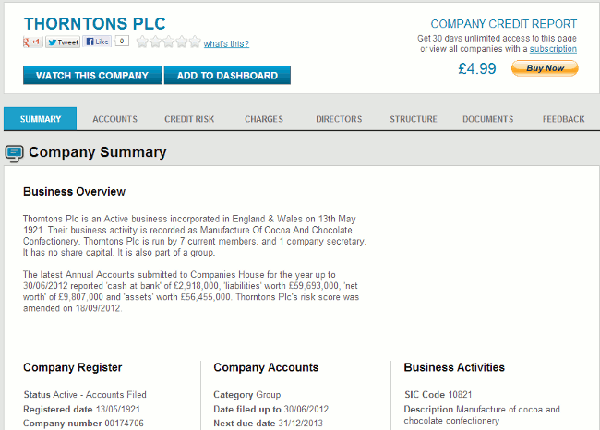
Also free of charge are the accounts and list of directors but you have to register (free of charge) to view the information. There are options for logging in with your Facebook, Twitter or Google account but if you prefer you can register a user name and password.
Five years of key financials (cash at bank, net worth, total current liabilities and total current assets) are shown as graphs and more detailed information is displayed in the Company Accounts Table.
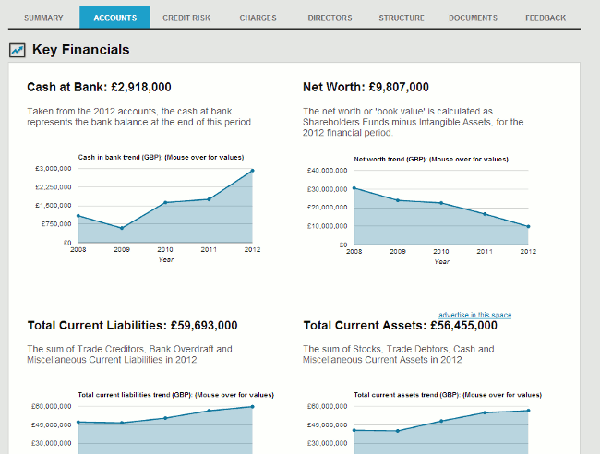
The financial statements submitted to Companies House can be downloaded free of charge as PDFs. Other documents lodged at Companies House such as “Change of director's details” or “Allotment of securities” are listed under the Documents tab and are £2 each.
The Credit Risk information (risk score, credit limit, payment data and key factors) and Charges (mortgages and County Court Judgments) are priced. For a single company the price is £4.99 + VAT, which gives you 30 days unlimited access to all premium credit data on that company for 30 days. If you are likely to be researching more than four companies on a regular basis it is worth upgrading to the All Companies options costing £20 + VAT. This gives you 30 days unlimited access to credit data across every company and director.
Current directors and secretaries for a company are listed free of charge. Previous directors and secretaries are part of the subscription service. The free director profile includes an overview, their registered details and a summary of the companies of which they are or have been a director. This can be more informative as a way of identifying connections between companies and other directors than looking at the company records in isolation. The full director report reports are £8.99 and include credit risk, CCJs, mortgages and charges, and a summary for each current appointment with key information taken from the associated company report.
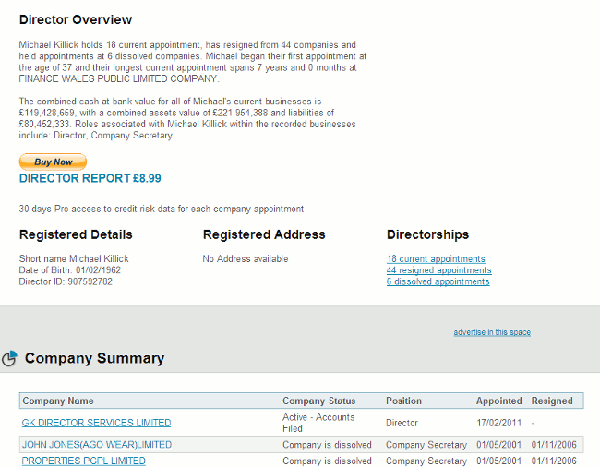
For both companies and directors you can set up free alerts and add them to a dashboard. This is an easy way to compare results for companies, with negative and positive changes in key financials shown as red or green arrows pointing up or down.
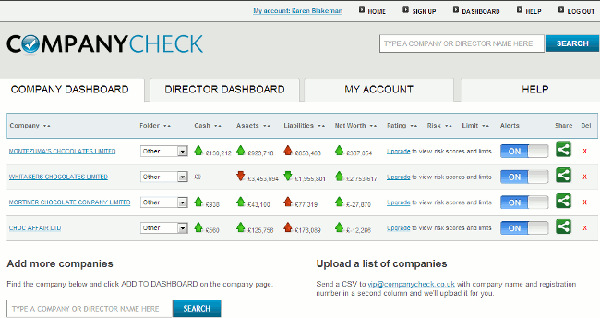
Company Check is not the only service providing free access to some of UK Companies House and Ireland company data. DueDil (http://www.duedil.com/) and Bizzy (http://bizzy.co.uk) are two others that are worth looking at. I understand, though, that Company Check is working on additional services that are due for launch in the next few months. It will be interesting to see what they come up with.
Twitter Notes
The following are some of my recent tweets and retweets. They are selected because they contain links to resources or announcements that may be of general interest. I have unshortened the shortened URLs
June 9th
Why Google Reader really got the axe http://www.wired.co.uk/news/archive/2013-06/07/why-google-reader-got-the-axe
June 10th
Nazlin Bhimani @NazlinBhimani
Your essential ‘how-to' guide to using Prezi in an academic environment via Impact of the Social Sciences http://blogs.lse.ac.uk/impactofsocialsciences/2013/06/07/prezi-in-the-academic-environment/ [Excellent article by Ned Potter]
LIS Research @LISResearch
RT @LIRGMarketing: RT"@libfocus: Using Social Media to Increase your Research Impact #altmetrics Using Social Media to Increase your Research Impact http://www.slideshare.net/mishdalton/social-media-for-researchers-22433236
Val Skelton @Valskelton
How Google knows what we're thinking: enhanced campaigns and session-based search http://econsultancy.com/uk/blog/62876-how-google-knows-what-we-re-thinking-enhanced-campaigns-and-session-based-search-2
Val Skelton @Valskelton
MT: Record how you search, not just what you find: digital research
http://blogs.lse.ac.uk/impactofsocialsciences/2013/06/10/record-how-you-search-not-just-what-you-find/
Henk van Ess @henkvaness
Voice Search and Google Now are getting better and better https://twitter.com/henkvaness/status/344054678352437248/photo/1
James Firth @JamesFirth
Nearly three years on, did that paywall help? Probably not - Times to axe 20 staff in bid to reduce losses http://www.pressgazette.co.uk/20-jobs-go-times-seeks-reduce-losses
Nice one! RT @mmangen: If they want to pick your brain, ask them to pick a time and method of payment http://www.marieforleo.com/2013/06/pick-your-brain/
June 11th
$37 to view a retraction notice! Retraction Watch http://retractionwatch.wordpress.com/2013/06/11/would-you-pay-37-to-find-out-that-a-publisher-had-mistakenly-printed-an-article-twice/
June 12th
Henk van Ess @henkvaness
Now Twitter Lets You See Which of Your Tweets People Are Actually Clicking http://www.slate.com/blogs/future_tense/2013/06/12/twitter_analytics_tool_lets_
you_see_which_tweets_your_followers_are_actually.html
June 17th
Alice Bell @alicebell
This Wellcome Trust resource on statistics is meant for schools, but suspect lots of people will find it interesting http://www.wellcome.ac.uk/Education-resources/Education-and-learning/Big-Picture/All-issues/Number-Crunching/index.htm
June 20th
All too true: "What's So Hard about Research?" Guest Blog, Scientific American Blog Network http://http://blogs.scientificamerican.com/guest-blog/2013/06/19/whats-so-hard-about-research/
Discussed some of these issues at NWLP yesterday. "Picture emerges over ‘gold' open-access allocations" THE http://www.timeshighereducation.co.uk/news/picture-emerges-over-gold-open-access-allocations/2004944.article
"Open access is a utopian pipe dream" THE http://www.http://www.timeshighereducation.co.uk/comment/opinion/the-bottom-line-is-that-journals-cost-money/2004889.article
June 25th
Tom Roper ?@tomroper
'So wide and varied': The origins and character of British information science' http://http://m.jis.sagepub.com/content/early/2013/06/21/0165551513492257.abstract?papetoc Journal of Information Science
Val Skelton @Valskelton
The smell of old books analysed by scientists via @Telegraph http://www.telegraph.co.uk/science/science-news/6554567/The-smell-of-old-books-analysed-by-scientists.html
June 28th
Ned Potter @theREALwikiman
Really good, useful stuff RT ?@rscsam Timely post on assumptions we may make about students' knowledge / skills http://www.insidehighered.com/blogs/library-babel-fish/tacit-knowledge-and-student-researcher#ixzz2XRFfYj6C
Forthcoming workshops and events
Pre-conference Workshop: Discover Sourcing 2013 afternoon pre-conference workshop on search skills
Date: Tuesday, 17th September 2013
Venue: Prospero House, 241 Borough High St, London, SE1 1GA
Organiser: UK Sourcers & Sourcing Hat Ltd.
Outline: This afternoon workshop is for up to 40 attendees and is designed to challenge sourcing skills. It is aimed at working sourcers/researchers who would like to push themselves.
URL http://uksourcers.co.uk/discover-sourcing/
Workshop: Business Information: Key Web Resources
Date: Thursday, 19th September 2013
Venue: London
Organiser: TFPL
Presenter: Karen Blakeman
Outline: T his workshop looks in more detail at the resources that are available for different types of information, alerting services and free vs. fee. It also covers search strategies for tracking down industry, market and corporate reports.
URL: http://www.tfpl.com/services/coursedesc.cfm?id=TR945&pageid=-9&cs1=business%20information&cs2=a
Workshop: How to Make Google behave: techniques for better results
Date: Wednesday, 30th October 2013
Venue: London
Organiser: UKeiG
Presenter: Karen Blakeman
Outline . Having problems with Google? Fed up with it ignoring your search terms and giving you something completely different? Personalisation, localisation, social networks and semantic search are all being used by Google in an attempt to improve relevance but it can all go horribly wrong. Austria suddenly becomes Australia and your search for goat's cheese turns into identifying different species of buttercups! Nevertheless, just one really good result in the top five is often enough to persuade us to return to Google again and again. There are many tricks we can use to make Google return better results and this workshop will look in detail at the options that are currently available to us.
URL: http://www.ukeig.org.uk/trainingevent/karen-blakeman-make-google-behave-techniques-better-results-0
Workshop: Free resources and search techniques for EU and UK legislation
Date: Wednesday, 13th November 2013
Venue: London
Organiser: TFPL
Presenter: Karen Blakeman
Outline: This one day workshop will look at free resources and search techniques for locating news and information on EU and UK legislation. Such information could be on blogs, websites, in news articles, journals and government reports. The original source of the information may not be in English and assessing authority and timeliness is crucial.
URL: http://www.tfpl.com/services/coursedesc.cfm?id=TR3838&pageid=-9&cs1=&cs2=f
Workshop: Anything but Google
Date: Tuesday, 19th November 2013
Venue: London
Organiser: UKeiG
Presenter: Karen Blakeman
Outline . You can say “No” to Google, and there are times when Google is the worst possible tool for researching a project. There really are other search tools that can give you better results. This workshop will look at non-Google options for searching the web, different types of information and media.
URL: http://www.ukeig.org.uk/trainingevent/anything-google-karen-blakeman-0
Contact Information
Karen Blakeman, RBA Information Services
Twittername: karenblakeman (http://twitter.com/karenblakeman)
Email: Karen.blakeman@rba.co.uk
Tel: +44 118 947 2256
Address: 88 Star Road, Caversham, Berks RG4 5BE, UK
Subscribe and Unsubscribe
To subscribe to the newsletter fill in the online registration form at http://www.rba.co.uk/tfttr/index.shtml
To unsubscribe, use the registration form at http://www.rba.co.uk/tfttr/index.shtml and check the unsubscribe radio button.
If you wish to change your subscription from the PDF to the Plain Text version, send an email to tfttr@rba.co.uk with "Plain Text Version Please" in the subject line.
Privacy Statement
Subscribers' details are used only to enable distribution of the newsletter Tales from the Terminal Room. The subscriber list is not used for any other purpose, nor will it be disclosed by RBA Information Services or made available in any form to any other individual, organization or company.
Copyright
Tales from the Terminal Room by Karen Blakeman is licensed under a Creative Commons Attribution-Non-Commercial 3.0 Unported License. For permissions beyond the scope of this license contact Karen Blakeman by email at Karen.Blakeman@rba.co.uk

